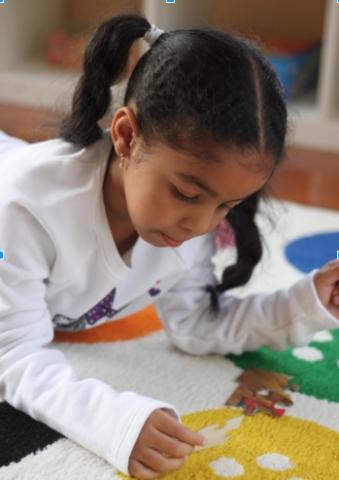
Courageous Conversations: How Moms and Families Can Have an Impact on Social Emotional Development through an Anti-Bias Approach
Moms don’t need much convincing: we know that the early childhood years are critically important in setting the stage for all that life has to bring, and the ways that children learn how to respond and react. Young children’s social and emotional development - that is, how they learn to relate to others around them, build relationships, and deal with conflict that naturally arises as part of human dynamics - is a foundation for all future learning. In support of children’s social-emotional development, families and practitioners can go beyond what we typically think of when we imagine teaching young children social skills to complement the refrains of “Be nice”, “Make sure to share”, or of course “Don’t hit!”
An anti-bias approach is an opportunity to announce and embed our collective commitment of creating a more just and equitable society, beginning with our young children. Since an anti-bias approach deals with confronting implicit biases and unfairness based on race, gender, socio-economic status, and so on, children must learn these skills early, and from adults they trust.
The goals of an anti-bias approach (many thanks to Louise Derman-Sparks, Carol Brunsen Day and their many colleagues along the way for pioneering definitions and practices to guide anti-bias efforts in early childhood education), are the following:
-
Each child will demonstrate self awareness, confidence, family pride, and positive social identities
-
Each child will express comfort and joy with human diversity, accurate language for human differences, and deep, caring human connections
-
Each child will increasingly recognize unfairness, have language to describe unfairness, and understand that unfairness hurts
-
Each child will demonstrate empowerment and the skills to act, with others or alone, against prejudice and/or discriminatory actions
The anti-bias goals go far beyond teaching every child that fairness and kindness are important. Achieving these anti-bias goals with the children in your care ensures that children move through their schooling and lives with the tools necessary to feel proud of themselves and their unique identities, comfortable with human difference, and the willingness and ability to recognize and work against the bias and injustice that they encounter.
In order to work through these goals, teachers, leaders and families need a clear understanding of young children’s development as it relates to social-emotional development, identity formation, understanding difference, and notions of fairness and justice. There are also actionable ways to begin integrating the anti-bias goals in your everyday life:
-
Develop a salient awareness of the important issues that young children are tackling as they grow so that the conversations we have with young children are informed and appropriate for their age. This may mean paying attention to what’s happening in the news and in the classroom so you can be prepared to unpack these events with your children.
-
Cultivate a deep knowledge of self as it relates to the issues of differences, identity, and fairness so that you can begin to model how your children should be interacting with those topics. This may mean reflecting on your relationships, the conversations you have in front of children, and your overall stance on these issues
-
Engage your children in authentic conversations about identity, differences, and fairness so that they are continuously developing outside of the classroom environment. This may mean asking them questions about their everyday interactions, how they feel about unfairness, and what are the ways they can stand up for others when unfair acts occurs.
-
Model how you envision your child embodying these anti-bias goals so that children have a distinct example of how they look in action. This may mean demonstrating pride in your cultural background and your overall identity, celebrating and learning about other cultures, and having challenging conversations about difference and fairness with other adults.
Many adults have said to us, children don’t need to be thinking about these “adult issues”, and that by taking an anti-bias approach, we may be teaching children to be biased. Some have wondered if it is best to teach only ways that people are the same, believing that that learning about differences can perhaps create prejudice or bias. On the contrary, research tells us that children are developing important understanding of the world around them, and that if these images are not informed by knowledgeable adults who feel comfortable to engage in discussions about children’s developing understandings and assumptions, children will make the best sense they can on their own, with the limited information that they have. Differences, in and of themselves, do not create bias and injustice. Children receive many messages about their own identity and the identity of those around them. Children learn bias from observing bias in their environment and society, both implicit and explicit—not from learning about human diversity. As adults, we must model for children proactive, healthy and valuing ways to respond to human difference.
As Moms, family members, and a community – we are committed to children’s healthy social and emotional development, building children’s identity, compassion, and skills around addressing the inequities and biases that occur everyday in our society. It is with this imperative that we encourage every Mom to read more, learn more, and engage in courageous conversations with the young children in your life. Our young children are waiting for us to show them the way…
Want to learn more about equitable approaches to facilitating courageous conversations with children from diverse backgrounds? Read our series on navigating crises with young children, linked here.



The views and opinions expressed in this post are those of the author(s) and do not necessarily reflect those of MomsRising.org.
MomsRising.org strongly encourages our readers to post comments in response to blog posts. We value diversity of opinions and perspectives. Our goals for this space are to be educational, thought-provoking, and respectful. So we actively moderate comments and we reserve the right to edit or remove comments that undermine these goals. Thanks!